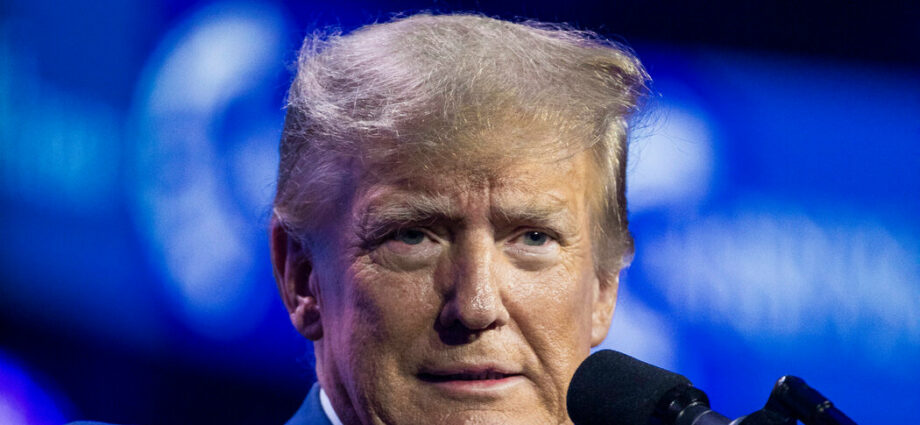Donald J. Trump, seeing an opening with organized labor, appealed on Thursday for an endorsement from the United Auto Workers for his White House bid and said only his return to the presidency could save the automotive industry from President Biden’s “ridiculous Green New Deal crusade.”
Mr. Trump’s apocalyptic vision of the state of the American auto industry does not comport with the reality of an auto sector that has steadily gained jobs over the past three years. But there has been friction between the White House and the new leadership of the old-line industrial auto union.
The United Auto Workers, which has a record of backing Democratic candidates for president, including Mr. Biden, has been angered with the Biden administration for pumping tax money into nonunion electric vehicle suppliers, and has withheld its endorsement, even as most labor unions have rushed to back Mr. Biden’s re-election. The U.A.W.’s new president, Shawn Fain, met with Mr. Biden in the White House on Wednesday as contract talks with the Big Three automakers heat up over electric vehicle parts suppliers.
In a video on Thursday, Mr. Trump predicted the demise of American auto manufacturing and the “slaughter” of 117,000 auto jobs. “I hope United Auto Workers is listening to this because I think you’d better endorse Trump,” he said. He explicitly warned that Mr. Biden’s policies would cost jobs in the key swing state of Michigan, as well as the more reliably Republican states of Ohio and Indiana.
The auto industry has actually gained jobs steadily since Mr. Trump left office, according to the Bureau of Labor Statistics. Employment among auto manufacturers and their parts suppliers reached 1,071,600 in June, up 129,000 since December 2020, the last full month of Mr. Trump’s presidency.
Mr. Trump’s insistence that electric vehicles are piling up unsold on car lots contradicts the industry’s own view of its inventory.
“We would assert that demand for traditional vehicles and for electric vehicles is strong,” said Matt Blunt, a former Republican governor of Missouri, now president of the American Automotive Policy Council, the domestic auto industry’s trade association in Washington. “This is a time of dramatic transition, but the U.S. industry is well positioned.”
But the tension between the U.A.W. and the Biden administration is real. It takes fewer workers to assemble an electric vehicle than one with an internal combustion engine. That has made organizing parts suppliers, especially battery makers, an imperative of the union’s insurgent new leadership.
Yet much of the new battery investment prompted in part by Mr. Biden’s climate change policies and infrastructure law is landing in the union-resistant Southeast, especially Georgia, a vital battleground state in the 2024 election. That state has had more than 40 electric vehicle-related projects introduced since 2020, promising investments worth $22.7 billion and the creation of 28,400 jobs.
Mr. Biden was at Philadelphia’s shipyard on Thursday, talking up new rules attached to his climate change law intended to help union apprenticeship programs vault workers into the middle class without a college degree.
“A lot of my friends in organized labor know, when I think climate, I think jobs,” he said. “I think union jobs.”
But Mr. Trump, looking beyond the Republican primaries to a rematch with Mr. Biden, continues to aim for the vote of union workers, if not their leaders.
Jonathan Weisman is a Chicago-based political correspondent, veteran journalist and author of the novel “No. 4 Imperial Lane” and the nonfiction book “(((Semitism))): Being Jewish in America in the Age of Trump.” His career in journalism stretches back 30 years. More about Jonathan Weisman
Source: Read Full Article
-
MP deletes tweet saying Rishi as PM ‘not a win’ for representation
-
Deal To Export Grains From Black Sea Ports Extended
-
Sunak warned he needs 150 votes to beat Boris otherwise ‘he wins’
-
Greg Hands urges people to ‘protect women’s rights’ with their vote
-
Hunter Biden Says Prosecutors Reneged on Major Part of Plea Deal

